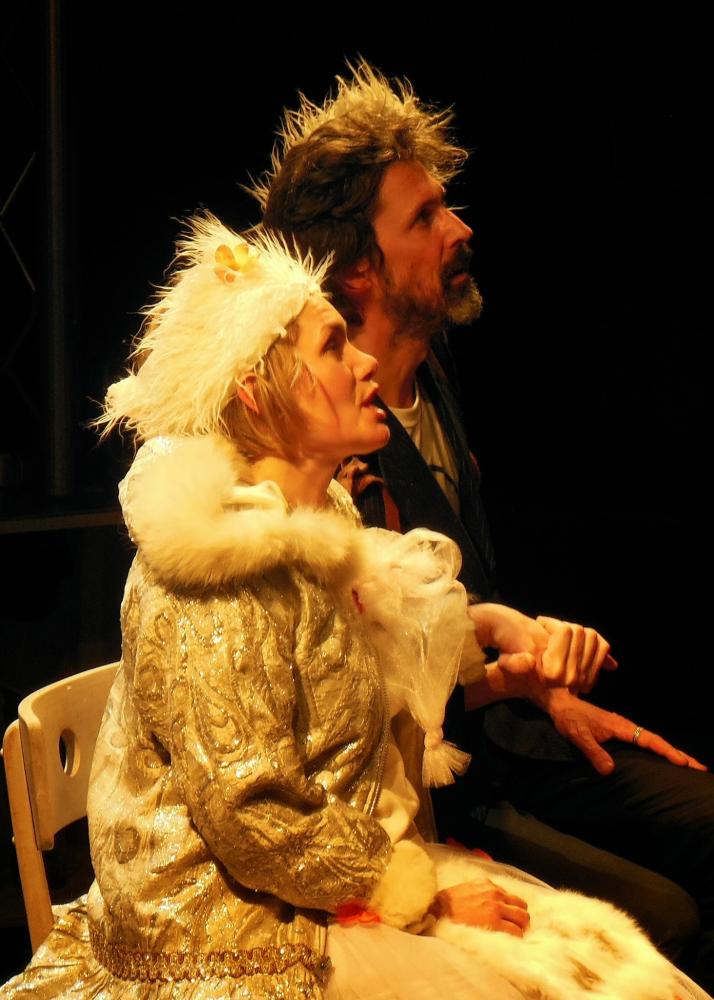First, Allison Waters was a performing artist, including multiple years as a member of the North American Cultural Laboratory – a New York theater company.
Then she earned her bachelor's degree in neurobiology from Stanford University and came to the University of Oregon as a doctoral student in clinical psychology.
Now, a stroke suffered by a friend and former theatrical colleague has pulled Waters back into theater, as a collaborating neuroscientist, performer and co-creator of "STRUCK." The play, which Waters says "bridges the domains of art and neuroscience," premiered at Cleveland Public Theatre last March and then played Off Broadway in December at New York City's HERE arts center.
"Needless to say, I'm pretty excited," Waters says.
Waters was cast in several plays as a member of the North American Cultural Laboratory (NACL) through the late 1990s, appearing in what would presumably be her final play with the company ("Arca Nova") in 2000. She did other theater work in productions large and small, and established a theater company in the Midwest.
She then focused on academia, earning her bachelor's degree from Stanford in January 2007.
She has been at the UO since September 2007, studying as a doctoral candidate under psychology Professor Don Tucker and working as a researcher at Electrical Geodesics Inc., where Tucker serves as chief executive officer. EGI, founded in 1992 as a developer of EEG systems for neurological research, has more than 80 employees and strong ties to the UO.
Waters' dissertation research, funded by a fellowship from the National Institute of Mental Health, investigates what she describes as "the neural substrate of the self." She uses brain-imaging tools to examine and compare neural processes associated with the self-identity of patients in healthy and clinical populations.
So it was right up Waters' academic alley when actress and NACL artistic director Tannis Kowalchuck suffered a major stroke in 2011. Kowalchuck devised her own exercise- and theater-based therapies to regain her physical abilities and skills as a performer. That regimen evolved into the premise for "STRUCK" – an exploration of how the brain and body look for meaning, struggle to communicate and rediscover the sense of “self” following a stroke.

"While conducting my research, (Kowalchuck) suffered a stroke," Waters says. "In response to that terrifying event, she and I (and others) co-created a piece of theater."
Waters was recruited to collaborate as a neurological expert in the creation of "STRUCK." She worked with Brett Keyser, an actor at NACL; New York playwright Kristen Kosmas; Canadian director Ker Wells; and Kowalchuck to piece together a multimedia play that takes audiences inside a stroke victim’s brain as the protagonist searches for understanding and identity, grappling with a basic struggle to exist.
The play incorporates video, a live and recorded musical score, and a custom-designed light installation based on the night-sky displays of the aurora borealis. Kowalchuck's character encounters characters including a shape-shifting angel figure (Keyser) and a neurologist (Waters).
"I appear in video to provide commentary on brain function and neural plasticity, and to encourage the protagonist as she grapples to understand her new identity," Waters says.
"'STRUCK' is a highly visceral piece of theater that attempts to relay to an audience the experience of stroke and recovery from neurological insult," she says.
A New York Times theater critic wrote in his Dec. 9 review that the play is "a bracing sort of stage poetry, an almost hallucinatory assemblage of dreams, fears and memories. It’s an effort to capture the experience of a stroke and a recovery, not as they would have been observed by a second party, but from the inside."
The Off-Broadway production of "STRUCK" was presented by NACL, the Cleveland Public Theatre, and Arnold and Roberta Krumholz. It received funding from the Ensemble Studio Theatre/Alfred P. Sloan Foundation Science and Technology Project; the New York State Council on the Arts, with the support of Gov. Andrew Cuomo and the New York State Legislature; and more than 250 individual donations.
- by Joe Mosley, UO Public Affairs Communications

